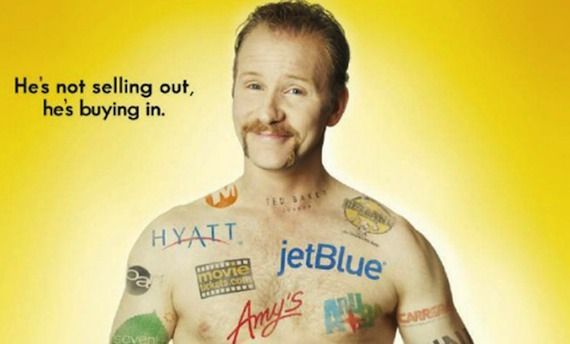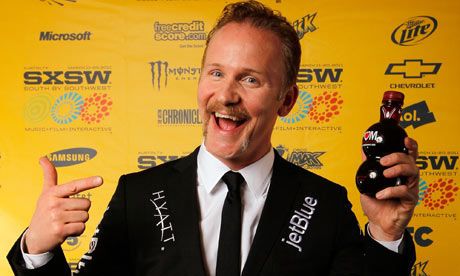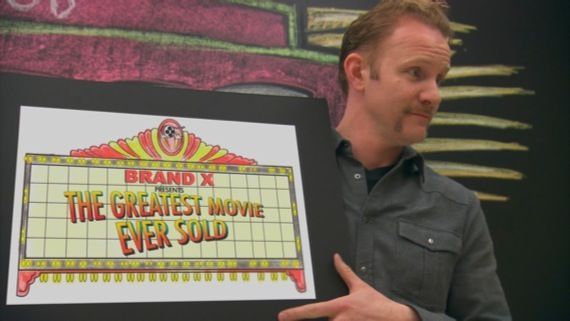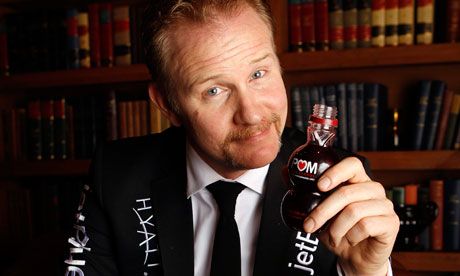Morgan Spurlock, the director behind the controversial films Super Size Me and Where in the World is Osama Bin Laden?, is back on the big screen with another thought-provoking documentary, POM Wonderful Presents: The Greatest Movie Ever Sold. And yes, that's the movie's actual name.
The film, which follows the director's attempts to finance a documentary about product placement in film and television using only product placement, offers a clever and often incredibly funny look into the seedy underbelly of Hollywood, where big business plays as important a role in a movie's success as the director.
During a press tour in support of the film, I had the chance to talk with Spurlock alongside fellow film journalist Locke Peterseim from Redblog, the official blog of Redbox. Read on for some of the highlights from our conversation.
One of the things that makes The Greatest Movie Ever Sold so enjoyable is how incredibly meta it all is. Spurlock has made a movie about the pervasiveness of advertising in films, which also happens to include three 30-second ads. He shares some of the most flagrant examples of product placement in TV and movies, then proceeds to top them all by placing his products in every scene of the film.
The film asks the audience whether Spurlock is selling out, or buying in. Sometimes it seemed as if Spurlock himself wasn't sure.
In our interview, Spurlock described how the constant exposure to advertisers and big brands rubbed off on him, and how the production of the film brought him closer to the world of marketing than he expected.
"You couldn't help it, especially after we were so rejected by every advertising agency, which wanted nothing to do with this film. We were so rejected by every product placement company. So then we started literally creating all of this campaign on our own and putting it together, and then people started asking our opinions on things. Like literally, we're on the phone with the brands getting ready for the marketing of the movie and they're coming to me for answers. You start to realize, 'Wow, I am literally on that precipice.'"
Luckily for Spurlock, the documentary format allowed him to be a sell-out, without actually selling out. For narrative filmmakers, finding the balance between product placement and good storytelling is far more difficult.
In the film, Spurlock talks with A-List directors like Quentin Tarantino, J.J. Abrams, Brett Ratner, and Peter Berg about marketing in films. In our interview, Spurlock explained how he got the directors to sit down on camera to talk about such a touchy subject.
"I think the only reason they talked to us is because they have a tremendous amount of power right now and they can talk. It's one of those things where I think there's not the repercussions that they would typically have, that other people may have. There won't be kickback for J.J. Abrams, or Quentin Tarantino, or Brett Ratner, or Peter Berg, who's making like a $200 million movie right now. I think that to get them on camera and to get them to be honest and to give their real thoughts and opinions on things was pretty incredible."
One scene in the film that struck me was when Spurlock meets with product placement veteran Norm Marshall. In the scene, Marshall tells Spurlock the story of how he forced a director to change one of his scenes through the mere threat of pulling sponsors. As a film fan, the story was fascinating, but also disturbing. How much sway do brands really have on films today?
"It's an incredible thing to think about the power that that money brings, especially in Hollywood, and it's kind of scary."
Spurlock went on to explain how filmmakers should be able to control outside commercial influences and why his film was successful because of its unique premise and the trust of his brand partners.
"I agree with J.J. Abrams who's like it's about storytelling, not story-selling. I live in a world where people drink Coke. They wear Nikes. They drive Camaros. But do I need to start up on the close-up of the Camaro logo when the car pulls into the scene and then zoom out, just so I know it's a Camaro? Just so you know that guy is driving up in that car?
I feel like the biggest thing that has to happen is you have to kick all these companies out of the writer's room. You have to get them out of this creative process completely... The reason this film works is because we were given freedom by every company that signed on to this movie. They said, 'You know what, we're going to believe in this idea. We don't have creative control. We have no control of the final cut. Go make the film.'"
One issue that comes up in the film, and also came up in our interview, was the viability of consumer protections. Spurlock talks with multiple consumer advocates in the film, one of whom suggests that there should be pop-up bubbles on the screen whenever a promotional product appears. I thought that was a pretty terrible idea, and Spurlock agreed. But is there a better alternative than the current model, which stuffs all of the product placement references in the end credits under the words "promotional consideration provided by..."?
Spurlock talked about the UK model, which incorporates a new rating system into programs with product placement.
"What's happening in the UK, because they've just made product placement legal there...at the beginning of a film where it says TV-MA or TV-G...when that thing comes up, you know, the rating card, right next to that before the show starts, there's another card that shows up that says 'P,' which lets you know that there's product placement in this whole show, that people have paid to put products in this program."
In addition to the issue of product placement in films and TV, The Greatest Movie Ever Sold also explores the general issue of oversaturation of advertising in our society. In one part of the film, Spurlock talks to school officials in Broward Country, Florida about how they sell advertising space to help pay for underfunded school programs.
Does that make the schools bad? Is it wrong to put ads in schools, which are supposed to be sacred learning environments? According to Spurlock, "nothing is sacred" when it comes to advertising.
"What I literally realized over the course of making this film is that we live in a time and a place where nothing is sacred. That literally if there's a place, a space, where you are captive even for that long [snaps fingers] -- whether it's an elevator, or a gas pump, or a urinal -- if there's a moment where you are in one place for like five seconds, then, you know what, somebody is going to try and sell you something in that moment."
During the screening of The Greatest Movie Ever Sold that I saw, Spurlock told the audience that he hoped this movie would be the Iron Man of documentaries, or what he's calling a "doc-buster." Given the film's humor and unique premise, it's definitely a possibility. Are you interested in checking out Pom Wonderful Presents: The Greatest Movie Ever Sold?
In addition to my interview, my Screen Rant colleague Mike Eisenberg had the chance to talk with Morgan Spurlock on camera. Mike talks with Spurlock about the process of making the film, as well as his upcoming projects including a documentary filmed during last year's San Diego Comic-Con. Check out the video embed below for Mike's interview, which comes via Chicago's Tribeca Flashpoint Media Arts Academy.
-
An Interview with Morgan Spurlock - Tribeca Flashpoint Academy from Tribeca Flashpoint on Vimeo.
-
POM Wonderful Presents: The Greatest Movie Ever Sold will get a limited theatrical release on April 22nd. Stay tuned for our official review of the film.




